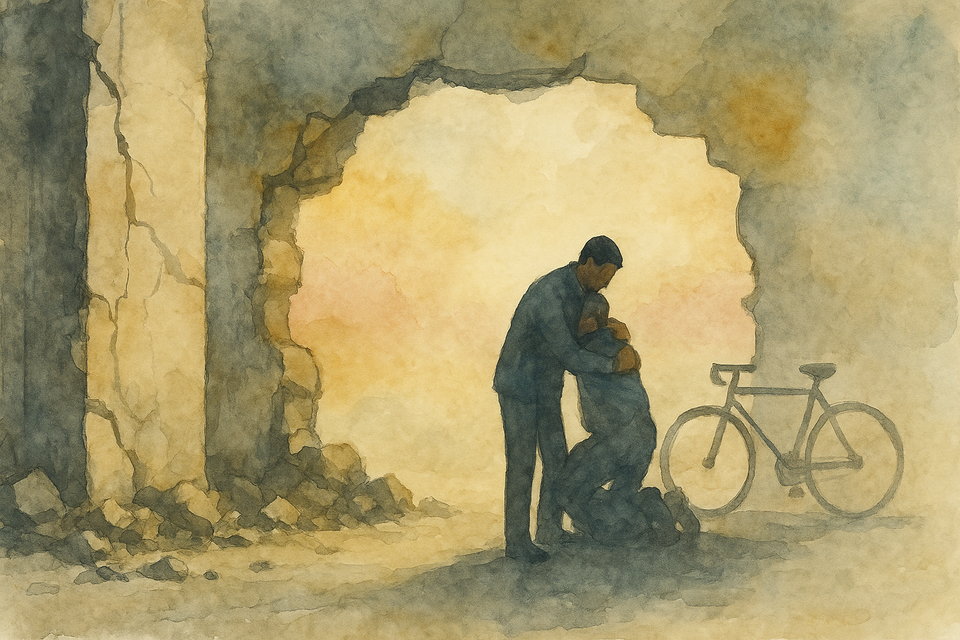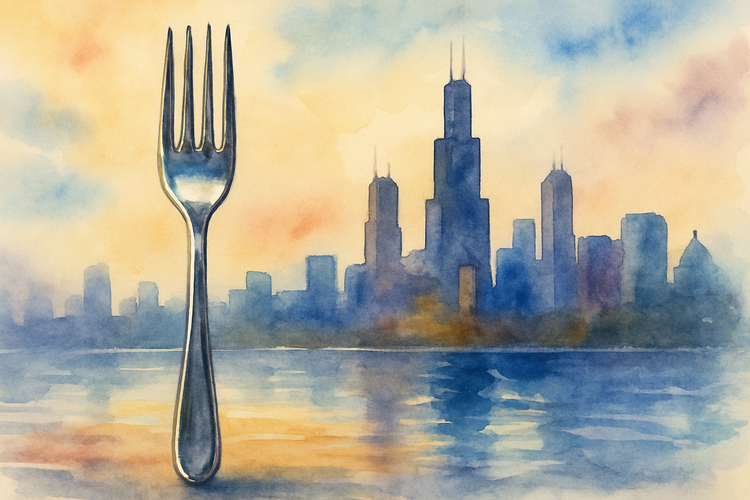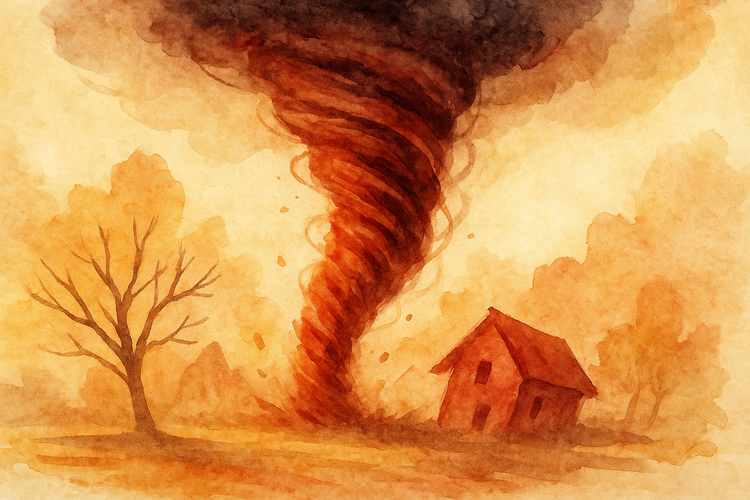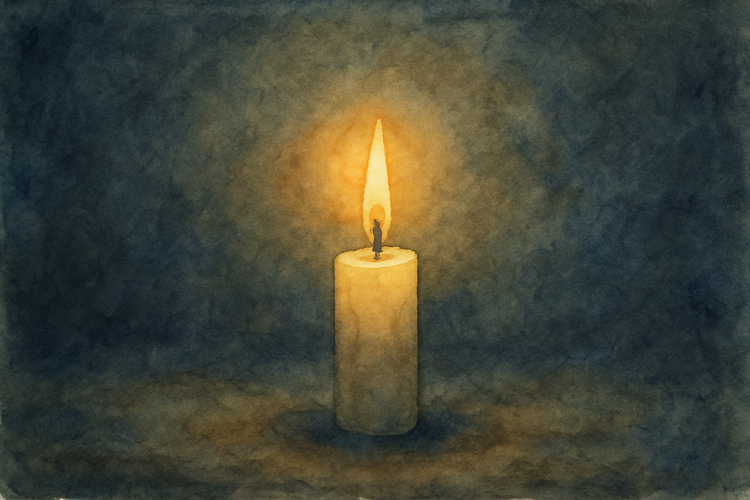The Bear S2E4 "Honeydew"

Spoilers ahead for Season 2 of The Bear.
Fragility and Collapse
The episode begins with a shudder — Natalie telling Carmy she’s pregnant just as the office wall gives way. It’s an image of sudden collapse, of fragile structures failing under pressure. The Bear often trades in these ruptures, where the physical mirrors the emotional and chaos comes rushing in. But in “Honeydew,” the story pivots away from that familiar rhythm. The crumbling wall becomes a kind of threshold: on the other side, we follow Marcus, whose journey is defined not by breakdown but by steadiness. Where others are undone by collapse, Marcus is revealed by what remains intact. Where walls fall, he builds quietly.
Caregiving Carried Abroad
Before Marcus boards a plane, he sits with his mother, telling her how excited he is for what lies ahead. She cannot answer, but the words matter all the same. For Marcus, caregiving is not simply tending to needs — it is presence, a way of being. Even in silence, his voice fills the space with steadiness, as though speaking aloud can stitch a thread between them that distance will not break.
That presence travels with him to Copenhagen, where the ache of leaving lingers alongside the thrill of learning. His calm is not the absence of feeling but the deep acknowledgment of it, carried without panic or collapse. In this way, caregiving becomes a kind of inheritance. The patience, attentiveness, and steadiness he has cultivated at his mother’s side do not remain confined to her sickroom — they shape how he approaches every whisk of cream, every turn of dough, every conversation held with quiet attentiveness. The show makes it clear: Marcus is not escaping his responsibilities, nor abandoning them. He is carrying them with him, allowing the gravity of care to guide how he moves through the world.
Care as a Way of Moving
In Copenhagen, the rhythm of Marcus’s days is marked not only by the kitchen but by the borrowed houseboat he inhabits. Its note of instructions — water the plants, mind the cat that may or may not appear — becomes a quiet covenant, and Marcus never shirks it. He tends these small obligations with the same devotion he gives to larger ones, as though the very act of looking after something fragile keeps him tethered. Even in unfamiliar surroundings, responsibility steadies him.
That instinct extends outward, too. When he sees a cyclist thrown from his bike and pinned beneath a barrier, Marcus is the one who lifts it away. The man embraces him, a full-bodied moment of contact between strangers, and then rides off again. It is a fleeting scene, but not an empty one: Marcus has released someone from being trapped, a gesture that mirrors his own entanglement in circumstance. He cannot step outside the gravity of his mother’s illness, cannot collapse the distance between caregiving and growth — but he can free what is before him, and in doing so momentarily free himself.
The power of the scene lies in its simplicity. Marcus doesn’t need the embrace to become story, or recognition to validate the act. Care, for him, is not a performance. It is simply offered, and then released. Together with the houseboat’s humble obligations, the cyclist’s sudden liberation sketches a portrait of constancy. For Marcus, care is not a burden to be shouldered only at home, nor a heroic act reserved for crisis. It is the quiet pattern of his life, the way he moves through the world.
Calm in the Kitchen
That same steadiness shapes Marcus’s time in the kitchen under Luca’s eye. Luca, humble and soft-spoken, tells a story — likely about Carmy — recalling how simply trying to keep pace made him better than he ever thought possible. It is not a boast but a confession, framed without ego, and Marcus receives it in the same quiet register. Their conversations, set against the precise labor of doughs and creams, carry none of the volatility we’ve come to expect from The Bear. There are no shouting matches, no plates hurled, no cutting rivalries.
Instead there is attentiveness — Luca showing, Marcus absorbing, both men committed to the craft in front of them. Even in this apprenticeship, Marcus’s calm is not erased but amplified: he learns through presence, through patience, through care. The kitchen itself becomes an extension of his caregiving nature, a space where steadiness is not weakness but strength.
A City Held Still
In a series defined by rupture and volatility, “Honeydew” inhabits a different frequency — one of gentle stillness. It offers a portrait of Marcus not as an escapee from chaos but as someone whose presence quietly resists it. From the crumbling wall in Chicago to the humble rituals aboard a houseboat, from his mother’s bedridden silence to a stranger’s fleeting embrace on a Copenhagen street, Marcus carries a calm core.
The episode mirrors that purpose with its own unhurried pace — long, lingering shots of water and sky, bicycles gliding along canals, spring light bending across windows. Copenhagen becomes more than backdrop; it becomes part of Marcus’s presence, a city whose rhythm reveals him by reflecting his steadiness back to us.
In the end, “Honeydew” doesn’t deny struggle — it simply insists that calm is not its absence. Calm is strength held steady, a form of devotion that endures, a way of moving through the world with care.



Comments ()